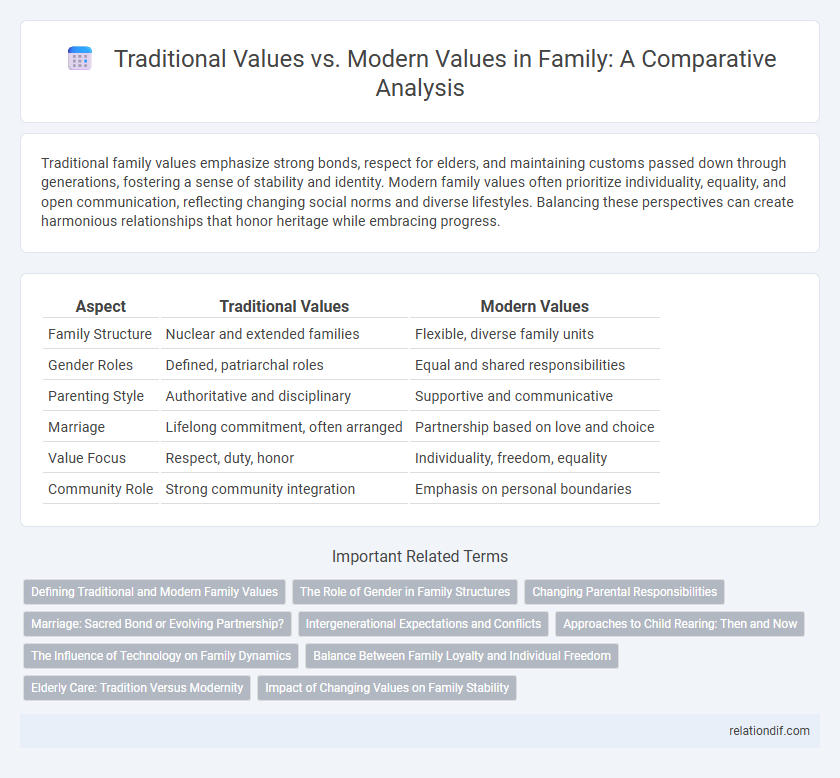Traditional family values emphasize strong bonds, respect for elders, and maintaining customs passed down through generations, fostering a sense of stability and identity. Modern family values often prioritize individuality, equality, and open communication, reflecting changing social norms and diverse lifestyles. Balancing these perspectives can create harmonious relationships that honor heritage while embracing progress.
Table of Comparison
| Aspect | Traditional Values | Modern Values |
|---|---|---|
| Family Structure | Nuclear and extended families | Flexible, diverse family units |
| Gender Roles | Defined, patriarchal roles | Equal and shared responsibilities |
| Parenting Style | Authoritative and disciplinary | Supportive and communicative |
| Marriage | Lifelong commitment, often arranged | Partnership based on love and choice |
| Value Focus | Respect, duty, honor | Individuality, freedom, equality |
| Community Role | Strong community integration | Emphasis on personal boundaries |
Defining Traditional and Modern Family Values
Traditional family values emphasize respect for authority, strong intergenerational bonds, and clearly defined gender roles rooted in cultural heritage and religious beliefs. Modern family values prioritize individual autonomy, gender equality, and diverse family structures that reflect changing societal norms and increased acceptance of different lifestyles. Both sets of values influence parenting styles, communication patterns, and decision-making processes within families across various cultures.
The Role of Gender in Family Structures
Traditional family structures often emphasize clearly defined gender roles, with men typically seen as providers and women as caregivers, reinforcing expectations rooted in cultural and historical norms. Modern family dynamics challenge these roles by promoting gender equality and shared responsibilities, reflecting social shifts toward inclusivity and individual choice. The evolution of gender roles within families influences parenting styles, household management, and emotional support systems, reshaping the foundational concepts of family life.
Changing Parental Responsibilities
Parental responsibilities have shifted significantly as modern values emphasize emotional support, open communication, and shared caregiving roles, contrasting traditional values that prioritized strict discipline and clear authority. Contemporary parents often balance work-life demands while fostering independence and critical thinking in children. This evolution reflects broader societal changes toward equality and child-centered family dynamics.
Marriage: Sacred Bond or Evolving Partnership?
Marriage remains a foundational institution deeply rooted in traditional family values, symbolizing a sacred bond of lifelong commitment and mutual support. Modern perspectives increasingly frame marriage as an evolving partnership emphasizing equality, personal growth, and adaptability to individual needs and societal changes. Balancing these views highlights the dynamic nature of marriage, blending respect for tradition with the flexibility required for contemporary relationships.
Intergenerational Expectations and Conflicts
Intergenerational expectations often shape family dynamics, with traditional values emphasizing respect, obedience, and collective decision-making, while modern values prioritize individual autonomy and open communication. Conflicts frequently arise when younger generations challenge established norms, seeking personal freedom and diverse lifestyles that contrast with elders' adherence to cultural customs. Navigating these differences requires mutual understanding to balance heritage preservation with evolving social values in family relationships.
Approaches to Child Rearing: Then and Now
Traditional child-rearing emphasized obedience, respect for authority, and clear boundaries, often relying on discipline to instill values. Modern approaches prioritize emotional intelligence, individuality, and open communication, encouraging children to express feelings and develop critical thinking. Both perspectives shape parenting styles, reflecting cultural shifts in understanding child development and family dynamics.
The Influence of Technology on Family Dynamics
Technology reshapes family dynamics by altering communication patterns, where digital devices often replace face-to-face interactions, challenging traditional values of togetherness. Modern values emphasize flexibility and digital connectivity, allowing family members to maintain relationships across distances but sometimes at the expense of shared physical experiences. The pervasive presence of smartphones and social media can both bridge generational gaps and create new disruptions in emotional bonding within families.
Balance Between Family Loyalty and Individual Freedom
Balancing traditional family loyalty with modern values of individual freedom requires respecting generational bonds while encouraging personal growth and autonomy. Emphasizing open communication fosters mutual understanding, allowing family members to honor cultural heritage without sacrificing self-expression. This equilibrium supports both collective cohesion and the development of unique identities within the family unit.
Elderly Care: Tradition Versus Modernity
Elderly care in family settings reflects a complex balance between traditional values that emphasize multigenerational cohabitation and respect for seniors, and modern approaches prioritizing professional caregiving and independence. Traditional family structures often involve close-knit support systems where elders play a central role in decision-making and cultural transmission. Modernity introduces healthcare technologies and institutional options that promote autonomy and specialized care, reshaping intergenerational dynamics and caregiving responsibilities.
Impact of Changing Values on Family Stability
Shifts from traditional to modern values significantly influence family stability by reshaping roles, expectations, and communication patterns among members. Traditional values often emphasize collective responsibility, hierarchy, and duty, which can foster structured support systems, whereas modern values prioritize individualism, equality, and personal fulfillment, sometimes leading to conflict or redefined relationships. Understanding the dynamic interplay between these value systems is essential to addressing challenges such as generational gaps, marital satisfaction, and child development within evolving family structures.
traditional values vs modern values Infographic

 relationdif.com
relationdif.com